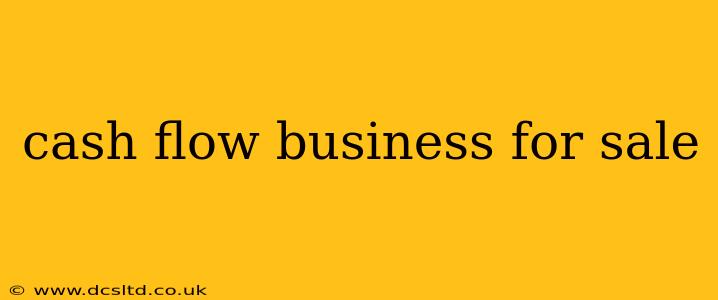The allure of a cash flow business for sale is undeniable. The promise of consistent income, relative stability, and potential for growth attracts savvy investors seeking financial freedom. However, navigating the market requires careful consideration and a keen understanding of what constitutes a truly profitable venture. This guide delves into the crucial aspects of identifying, evaluating, and acquiring a cash flow business that aligns with your investment goals.
What Makes a Strong Cash Flow Business?
Before diving into the specifics of finding businesses for sale, let's define what makes a cash flow business strong. A truly robust cash flow business isn't just profitable; it generates consistent positive cash flow after all expenses are paid. This means the business generates more cash than it consumes, allowing for reinvestment, debt repayment, and ultimately, a strong return on investment for the owner. Key characteristics include:
- Recurring Revenue Streams: Businesses with predictable, recurring revenue, such as subscription services or long-term contracts, offer greater financial stability.
- Low Inventory/Asset Requirements: Businesses with minimal inventory or capital-intensive assets typically require less upfront investment and reduce operating costs.
- Scalability: A business with potential for growth and expansion offers greater long-term return potential.
- Strong Management Team: Even the best business model needs capable leadership to execute effectively.
- Established Customer Base: A loyal clientele reduces reliance on constant marketing and sales efforts, leading to more predictable cash flow.
Where to Find Cash Flow Businesses for Sale?
Several avenues exist for discovering promising cash flow businesses available for acquisition. These include:
- Business Brokers: These professionals specialize in facilitating business sales and have access to a wide network of potential opportunities. They can filter options based on your specific criteria.
- Online Business Marketplaces: Websites dedicated to listing businesses for sale offer a broad selection, often with detailed financial information.
- Networking: Attending industry events and connecting with business owners can uncover hidden gems not publicly advertised.
- Direct Outreach: Identifying businesses you admire and directly contacting the owners to inquire about potential sales can be surprisingly effective.
What are the Common Types of Cash Flow Businesses for Sale?
Many business types are known for generating strong cash flow. Popular examples include:
- Service-Based Businesses: These often require less capital investment and can be highly profitable with efficient operations. Examples include cleaning services, landscaping, consulting, and home repair businesses.
- E-commerce Businesses: Online stores, particularly those with established brands and customer bases, can generate significant and consistent revenue.
- Franchise Businesses: Franchises benefit from established brand recognition, operational systems, and ongoing support.
- Rental Businesses: Real estate rentals, equipment rentals, or even self-storage facilities often provide steady income streams.
What Due Diligence is Essential Before Buying a Cash Flow Business?
Acquiring a business is a significant investment; thorough due diligence is paramount. This process involves:
- Financial Statement Analysis: Scrutinize financial records to identify trends, profitability, and potential risks. Look beyond top-line revenue and focus on key metrics like gross profit margin and cash flow.
- Market Research: Assess the market conditions, competition, and overall demand for the business's products or services.
- Legal Review: Engage legal counsel to review contracts, licenses, and other legal documents to ensure compliance and mitigate potential liabilities.
- Operational Assessment: Evaluate the business's efficiency, processes, and operational capabilities. Identify areas for improvement and potential cost reductions.
How Can I Finance the Purchase of a Cash Flow Business?
Securing financing is crucial. Common options include:
- Small Business Loans: Banks and credit unions offer loans specifically designed for business acquisitions.
- SBA Loans: These government-backed loans often come with more favorable terms.
- Private Equity: Private investors may provide funding in exchange for equity in the business.
- Seller Financing: The current owner may agree to finance a portion of the purchase price, spreading payments over time.
What are the Potential Risks of Buying a Cash Flow Business?
While promising, purchasing a cash flow business involves inherent risks:
- Overvaluation: Paying too much for a business can significantly impact your return on investment.
- Hidden Liabilities: Unforeseen legal or financial issues can arise after acquisition.
- Market Changes: Changes in market demand or competition can negatively affect profitability.
- Management Challenges: Integrating the business into your existing operations or managing a new team requires careful planning.
Are there tax implications I should be aware of when buying a cash flow business?
Yes, acquiring a cash flow business has significant tax implications. You'll need to understand how the purchase price is allocated between assets, the potential for depreciation deductions, and the tax treatment of any financing. Consult with a tax professional to understand the specific implications for your situation. They can help you plan strategically to minimize your tax burden.
By carefully considering these factors and undertaking thorough due diligence, you can increase your chances of finding a successful cash flow business that meets your financial goals. Remember, seeking professional advice from financial advisors, legal counsel, and tax professionals is crucial throughout the acquisition process.
